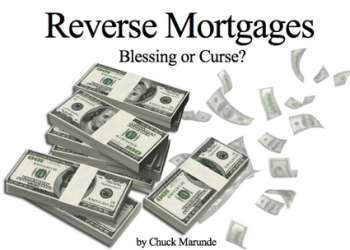 Reverse Mortgages can be great for some retirees, and I’ve written about some of the dangers of reverse mortgages in an earlier article, but a reverse mortgage can also be a great financial planning tool for retirees, and Buck Gieseke explains how in this article.
Reverse Mortgages can be great for some retirees, and I’ve written about some of the dangers of reverse mortgages in an earlier article, but a reverse mortgage can also be a great financial planning tool for retirees, and Buck Gieseke explains how in this article.
Reverse mortgages are one of the most misunderstood home financing tools available today. As a mortgage originator for almost two decades, I was adamantly opposed to writing this type of loan until mid 2006. That is when I got the facts.
Reverse Mortgages – Myths
What if I outlive the benefit – You can not outlive a reverse mortgage. If you live to be 120, you still will not have to make a mortgage payment. Being upside down in value – Because the loan is insured by the FHA, you will never owe more than the sale of the home (even if it depreciates). Losing title or control of the property – Title remains in the homeowner’s name. Burden or responsibility is passed on to my heirs –Your reverse mortgage is secured by the equity in your home so your heirs are never personally liable. Upon my death, my heirs do not inherit my home -Your heirs do inherit your home / property and have the option to sell it or refinance.
90% of the reverse mortgages originated today are FHA / HUD Home Equity Conversion Mortgages (HECM). These are insured by the FHA and have been growing in popularity over the recent years.
Reverse Mortgages – Qualification
To qualify for a Reverse Mortgage, you must be at least 62 years of age, have an equity position in your home and undergo free counseling from a HUD approved agency. Income, employment and credit are not considered for qualification. There are no medical tests or histories required. It almost sounds too good to be true – and that is why it took me so long to offer this valuable tool to those that could benefit. Dollar amount available is determined by borrower age and equity position.
The cost of an FHA / HUD reverse mortgage (HECM) is similar to that of a refinance. Interest rates are typically lower than the most competitive rates offered by traditional mortgages. Also, similar to most refinances, all of the costs are packaged into the loan to eliminate out of pocket expenses. You are still responsible for paying your property taxes and home owner’s insurance and for making property repairs but will not have a mortgage payment as long as you live in the home.
Upon closing, the proceeds from a Reverse Mortgage will first pay off any existing mortgage (if there is one). The (remaining) proceeds are tax-free and can be spent at the homeowner’s discretion – and with no impact to other benefits such as Social Security or Medicare.
The funds can be accessed or used in a combination of ways. Some will take a lump sum, pay off debt (if needed / desired) and keep the remainder as a reserve for living expenses. Others choose to receive a monthly amount similar to receiving a paycheck – remember this is from home equity so it’s tax free. Many like the security of knowing they can readily draw on the equity in their home should they need or want to – regardless of reason; It may be to cover increasing healthcare and day-to-day living expenses, to do the traveling that they have always dreamed of doing or helping grandchildren fund their college education. More and more people are using the proceeds to purchase a vacation or second home. The Reverse Mortgage allows the borrowers to pay cash for the home, have no mortgage payments and actually have two properties appreciating in value.
Reverse Mortgages – Financial Security
Whatever the reason, a properly planned Reverse Mortgage can, provide security, personal independence and an overall improved quality of life – allowing those who chose a Reverse Mortgage to live life on their terms.
Buck Gieseke
Integrity One Home Mortgage, Inc.
22 Lee Chatfield Avenue
Sequim, WA 98382
(877) 565-2070
Reverse Mortgages can be good financial tools for some retirees.
Last Updated on September 16, 2011 by Chuck Marunde





























Excellent points on reverse mortgages and the dangers, especially when it comes to reverse mortgages and widows. Reverse mortgages are definitely not for everyone, but they may be ideal for some.
This article is completely mis-leading. Seniors never receive the truth about these loans that they are completely responsible for understanding the consequences for their personal, health & financial circumstances – and long term need. If a borrower takes a lump sum payment they need to financially plan for the rest of their lives. Long term care costs 50,000-150,000 per year. The HUD “government approved” counseling is not free. It is bundled right into the staggering costs of these complex financial products. Borrower’s pay huge premiums for FHA insurance to protect the lender. The interest is compounded making the loan grow and eat any remaining equity.
Thanks. Nice post. I didn’t know where Sequim WA was, but then I started reading your real estate blog, and definitely like what I see and what I’m reading about here. Planning a trip to the Olympic Peninsula in June. Maybe we can buy you a cup of coffee at Starbucks Chuck.